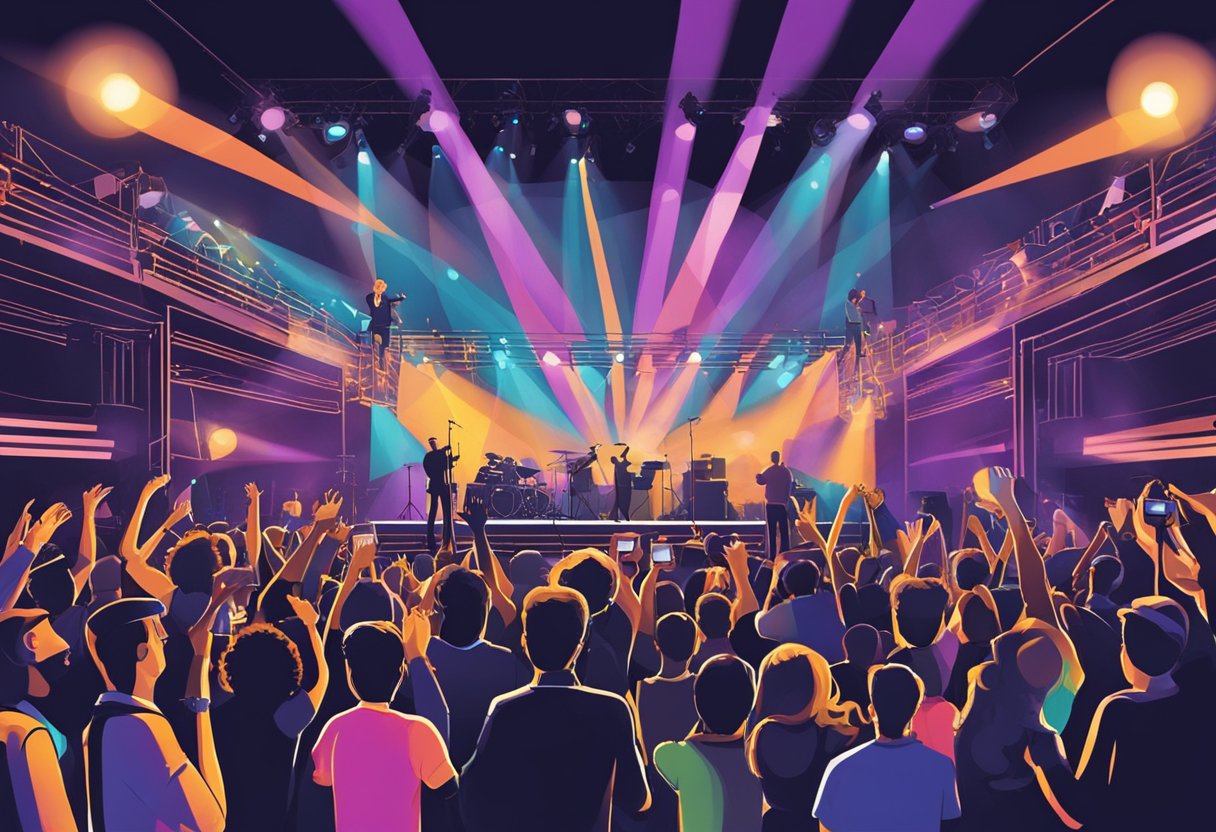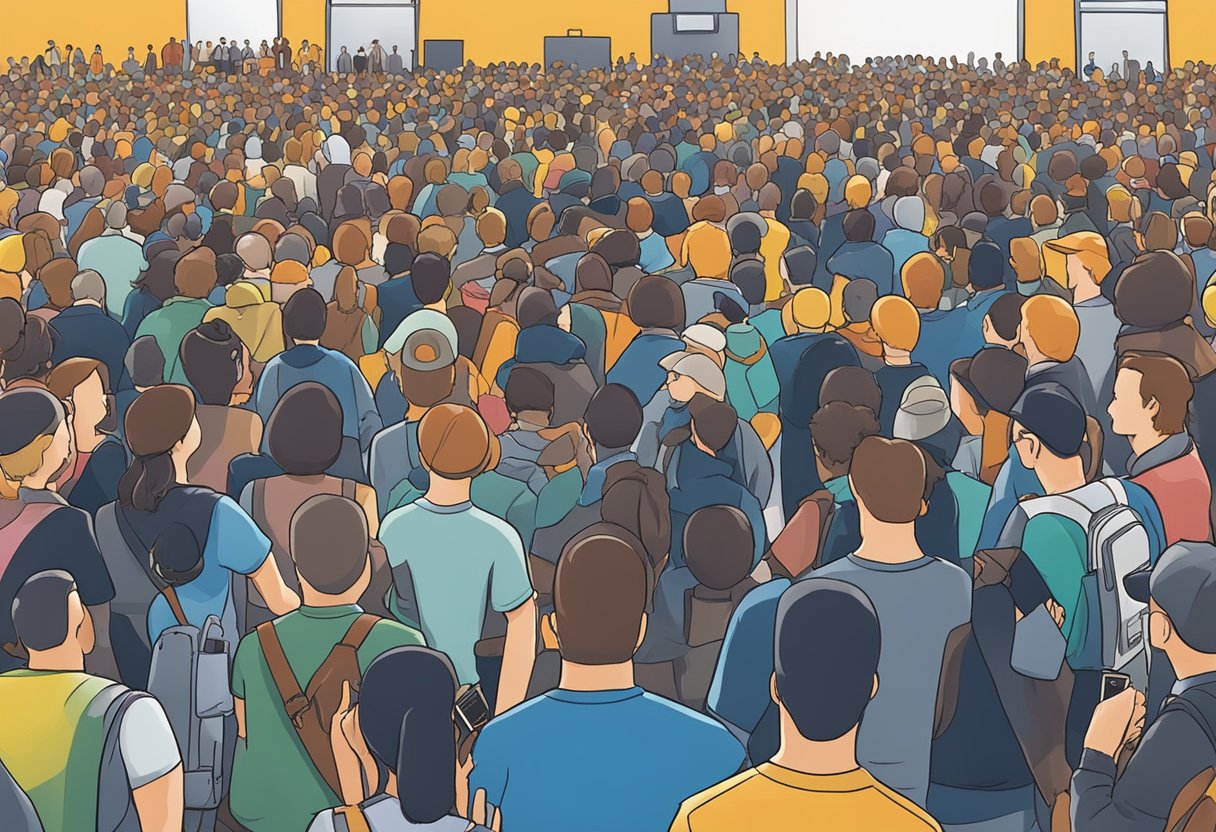Attending a concert is an exciting experience that many people look forward to. You may be wondering if you can bring a camera to capture the moment. The answer to this question depends on the concert venue’s camera policy.

Most concert venues allow compact cameras and phones for personal use. However, professional cameras and recording devices usually require prior permission. It is essential to check the venue’s policy before bringing a camera to the concert. Some venues prohibit cameras outright, while others have specific restrictions on the types of cameras you can bring and where you can use them. To avoid any problems, it’s best to confirm beforehand to ensure compliance and to make sure you can be present in the moment without worrying about your camera.
Understanding Camera Policies at Concerts

If you’re planning to attend a concert, you might be wondering if you can bring your camera with you to capture the memories. Camera policies at concerts can vary depending on the venue and the type of camera you have. In this section, we’ll break down the general rules and regulations, the difference between professional and compact cameras, and specific venue policies.
General Rules and Regulations
Most venues have a set of rules and regulations that apply to all events, including concerts. These rules are in place to ensure the safety and enjoyment of all attendees. Some common rules include no smoking, no outside food or drinks, and no weapons. When it comes to cameras, most venues allow compact cameras and smartphones, but professional cameras and recording devices usually require prior permission.
Professional Cameras vs. Compact Cameras
Professional cameras are typically larger and more advanced than compact cameras. They often have interchangeable lenses, high-resolution sensors, and advanced features for capturing images and videos. Compact cameras, on the other hand, are smaller and more portable. They’re designed for everyday use and often have limited features compared to professional cameras.
When it comes to camera policies at concerts, the type of camera you have can make a difference. Some venues allow compact cameras but prohibit professional cameras, while others may allow both with prior permission. It’s important to check the venue’s policy before bringing your camera to the concert.
Specific Venue Policies
Each venue may have its own camera policy that applies to concerts and other events. For example, Madison Square Garden allows cameras but prohibits equipment such as tripods, monopods, selfie sticks, audio recording devices, and video recorders. The NFL has a strict policy that prohibits DSLR cameras with detachable lenses from being brought into stadiums. However, small cameras and smartphones are allowed as long as they do not interfere with the enjoyment of other fans.
To determine if cameras are allowed at the specific venue that you will be visiting, please search for that venue from our home page. Once on the venue page, click Venue Details to determine if a camera will be permitted at that venue.
In summary, camera policies at concerts can vary depending on the venue and the type of camera you have. It’s important to check the rules and regulations for the specific venue you will be attending to ensure that you don’t run into any issues.
What to Bring to a Concert
Going to a concert is an exciting experience, but it is important to come prepared with the right items to make the most of your time. Here are some essential items that you should consider bringing to a concert:
Essential Items Checklist
- Tickets: Make sure to bring your concert tickets with you. You can either print them out or have them on your phone.
- ID: Bring a valid form of identification such as a driver’s license or passport. Some venues may require ID to verify your age or identity.
- Fully charged phone and portable charger: You’ll want to capture memories and share them with your friends on social media, so make sure your phone is fully charged. It’s also a good idea to bring a portable charger just in case your phone battery runs out.
- Cash and credit card: Bring some cash and a credit card in case you want to purchase merchandise or food and drinks at the concert.
- Earplugs: Concerts can be loud, so it’s a good idea to bring earplugs to protect your ears and make the concert more enjoyable.
- Sunscreen: If the concert is outdoors, make sure to bring sunscreen to protect your skin from the sun’s harmful rays.
- Hat and gloves: If the weather is cold, bring a hat and gloves to stay warm.
Prohibited Items
While there are many essential items that you should bring to a concert, there are also some items that are prohibited. Here are some common items that you should leave at home:
- Professional cameras: Most venues do not allow professional cameras or recording devices inside. Check with the venue’s camera policy before attending the concert.
- Weapons: Weapons of any kind are strictly prohibited at concerts.
- Illegal drugs: Possession or use of illegal drugs is not allowed at concerts.
- Outside food and drinks: Most venues do not allow outside food and drinks. Check with the venue’s policy before bringing any food or drinks.
- Large bags and backpacks: Large bags and backpacks are usually not allowed inside the venue. Check with the venue’s policy before bringing any bags.
By following these guidelines, you can ensure that you have a safe and enjoyable concert experience.
Tips for Concert Photography
If you’re planning to bring your camera to a concert, here are some tips to help you capture great shots while respecting the performers and audience.
Maximizing Your Camera’s Potential
To get the best shots in a concert setting, you need to maximize your camera’s potential. Here are some tips to help you do that:
-
Use the right lens: A fast lens with a wide aperture is ideal for concert photography. This will allow you to capture sharp images in low light conditions. A zoom lens is also useful for getting close-up shots of performers on stage.
-
Adjust your camera settings: Set your camera to manual mode so you have full control over the settings. Adjust your ISO, shutter speed, and aperture to suit the lighting conditions. Use a high ISO setting to capture more light, but be aware that this can result in more noise in your images.
-
Avoid using flash: Flash photography is usually not allowed at concerts, and even if it is, it can be distracting to performers and other audience members. Instead, use the available light and adjust your camera settings to compensate.
Respecting Performers and Audience
When taking photos at a concert, it’s important to be respectful of the performers and other audience members. Here are some tips to help you do that:
-
Stay out of the way: Don’t block the view of other audience members, and don’t get in the way of performers or security personnel. Stay in your seat or designated area and be aware of your surroundings.
-
Avoid using flash: As mentioned earlier, flash photography is usually not allowed at concerts. Even if it is allowed, it can be distracting to performers and other audience members. Avoid using flash and use the available light instead.
-
Be mindful of others: Don’t take photos of other audience members without their permission, and don’t take photos of performers that could be considered invasive or disrespectful. Remember that everyone is there to enjoy the concert, and your actions should not detract from that experience.
By following these tips, you can capture great shots at a concert while respecting the performers and audience. Just remember to be mindful of your surroundings and to use your camera in a way that is both effective and respectful.
Dealing with Security at Concerts

When attending a concert, it is essential to know how to deal with security personnel and handle restricted items. Here are some tips to keep in mind:
Security Personnel Interaction
Security personnel are there to ensure everyone’s safety and to enforce the venue’s rules and regulations. It is essential to be respectful and cooperative with them to avoid any issues. Here are some things to keep in mind when interacting with security personnel:
-
Follow their instructions: If security personnel ask you to do something, such as move to a different location or put away your camera, it’s best to comply. Refusing to do so could result in being asked to leave the venue.
-
Be polite: A little kindness can go a long way. Being polite and respectful can make the interaction with security personnel go more smoothly.
-
Don’t argue: If you have an issue with a security personnel’s decision, try to calmly discuss it with them. However, arguing or becoming confrontational is not helpful and could lead to being removed from the venue.
Handling Restricted Items
Many venues have restrictions on what items you can bring to a concert. Some common restricted items include recording devices, selfie sticks, and tripods. It’s essential to check the venue’s policies before attending the concert. Here are some tips for handling restricted items:
-
Leave restricted items at home: If you’re unsure whether an item is allowed, it’s best to leave it at home to avoid any issues.
-
Check the venue’s policies: The venue’s website or ticketing platform should have information on what items are allowed and what items are prohibited.
-
Be prepared to pay fees: Some venues may allow certain restricted items for a fee. If you’re planning to bring a camera or other recording device, be prepared to pay a fee if it’s allowed.
By following these tips, you can ensure a smooth and enjoyable concert experience while avoiding any issues with security personnel or restricted items.
Gaining Access to Concerts with Cameras
If you’re planning on bringing a camera to a concert, there are a few things you need to know to gain access. Here are some tips to help you get the shots you want:
Obtaining a Press Pass
If you’re a professional photographer or working for a media outlet, you may be able to obtain a press pass. A press pass allows you to bring professional equipment into the venue and take photos from the press pit, which is usually located in front of the stage. However, press passes are not easy to come by and require a lot of preparation and networking. You will need to contact the artist’s management team or the venue’s press office well in advance to apply for a press pass.
Venue-Specific Access Tips
If you don’t have a press pass, you can still bring a camera to a concert, but the rules will vary depending on the venue. Some venues allow point-and-shoot cameras and smartphones, but prohibit professional cameras and recording devices. Other venues may allow mirrorless cameras or have specific areas designated for photography. It’s important to check the venue’s camera policy before you arrive to avoid any issues at the door.
Here are some tips to help you gain access to concerts with cameras:
- Check the venue’s website or call the box office to find out the camera policy.
- Arrive early to the venue to give yourself enough time to go through security and any additional screening.
- Be polite and respectful to the security staff and follow their instructions.
- Avoid using flash photography, as it can be distracting to the performers and other concert-goers.
- If you’re using a professional camera, be prepared to show your credentials or explain why you need to bring the camera into the venue.
By following these tips, you can increase your chances of gaining access to concerts with cameras. Remember to always respect the venue’s rules and regulations, and be considerate of other concert-goers when taking photos.
